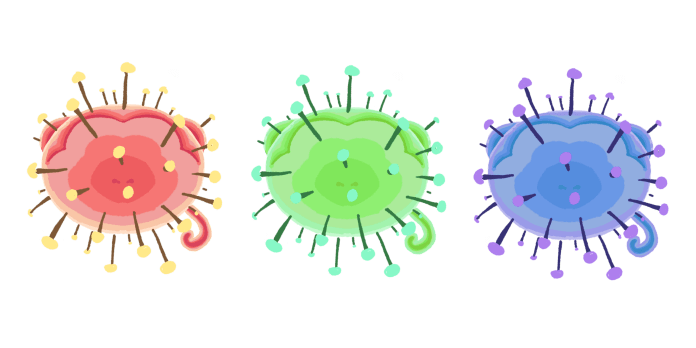The Epicenter of Monterey County hosted their Virtual Monkeypox (MPX) Seminar: Science and Stigmas online presentation on Aug. 23.
The Zoom presentation covered information regarding monkeypox, how it spreads, what the effects are, and what to do if exposed. The seminar also discussed LGBTQIA+, Black, and brown community stigmas.
Infectious Disease Specialist Dr. Allen Radner led the first part of the seminar regarding MPX, where it comes from, its effects, and where to go if exposed.
Dr. Radner noted our severe lack of knowledge regarding MPX in general.
“There’s a very high chance that if you see a provider right now with concerns, you may know more than they do,” said Dr. Radner. “We are still trying to understand this.”
MPX is a viral illness as well as a DNA virus. DNA viruses tend not to mutate like RNA viruses, meaning that there is a very low chance that they will adapt and mutate like COVID.
The viral illness is part of a family of viruses called Poxviridae. Getting immunity to any of the viruses in the family protects you from contracting any others in the same family.
MPX was first found in lab monkeys in 1955. There are two significant strains, one sourced in Western Africa and the other in Central Africa. The strain that we are currently facing is from Western Africa and has a much lower mortality rate(<10%) than the Central African strain (10%).
The outbreak began in May 2022. The initial cases were predominantly in the United Kingdom, Spain, and Portugal.
Historically, after being exposed and during the incubation period, it is not infectious and most people are unaware that they have MPX. Then you start experiencing symptoms like fevers, chills, headaches, and fatigue. Then you begin to contract a rash and lesions on places like the mouth, face, palms, feet, and genitalia. During this stage, you are infectious.
In 2022, if you are exposed, research has shown that symptoms are generally less aggressive. People are getting fewer lesions that start at the site of physical contact and then appear across the body. There is no prodrome.
If exposed, a person should isolate themselves until the rash has fully resolved, avoid close contact with others, and not share potentially contaminated items. Also, avoid close contact with pets.
The Department of Public Health recommends limited activities outside of the home if respiratory symptoms have been resolved and no new lesions have appeared for at least 48 hours.
“If you are exposed, particularly in four days, if you get vaccinated, it will dramatically improve the course of the disease,” said Dr. Radner.
An exposed individual should consider using antivirals such as TPOXX as treatment if they are hospitalized, immunocompromised, under 8 years old, pregnant or breastfeeding, IBD, or have severe dermatologic disease.
There is no vaccine designed explicitly for MPX; the vaccines currently used are for smallpox. The two available vaccines are ACAM20000 and Jynneos.
Currently, the Jynneos vaccine is being prioritized for certain immunocompromised groups.
Monterey County’s Assistant Director of Public Health, Kristy Michie took over the second half of the informational seminar, where she detailed what people should do if exposed to MPX.
If you have been exposed, call the Monterey Communicable Disease Unit at 831-755-5100. They are vaccinating infected individuals.
“It is important that you get vaccinated within the first couple days,” said Michie.
If you have symptoms, contact your medical provider to be evaluated and tested, and stay home until you get your test results.
Those interested in being tested for MPX can visit the Monterey County Health Department (831 755-4521), Salinas Valley Medical Clinic, Seaside Family Health Center, and some private medical offices.
Unfortunately, there are few treatment options available at the moment and clinics in Monterey do not currently have access to antiviral treatment options like TPOXX. The clinics are undergoing the appropriate processes to be able to access treatments in the coming weeks.
As of recently, the Monterey County Health Department is administering the intradermal route of vaccination. Both vaccines have the same level of efficacy.
The Monterey County Health Department plans to host vaccine clinics similar to the COVID vaccine clinics and hosted a MPX Vaccination Clinic on Saturday, Aug. 27. Vaccines will be given out on a first-come, first-served basis for those without an appointment.
To follow future MPX vaccination clinics, check out Monterey County Health Department.
Additional Resources
Monterey County Health Department Monkeypox (MPX) Website:
Monterey County Health Department Social Media:
Twitter: @Washcoverstay
Instagram: @Mchdstdandhiv
California Department of Public Health Monkeypox (MPX) Website:
https://www.cdph.ca.gov/Programs/CID/DCDC/Pages/Monkeypox.aspx
CDC Monkeypox (MPX) Website:
https://www.cdc.gov/poxvirus/monkeypox/index.html
To view the seminar:

